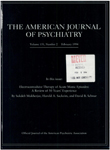Lithium, benzodiazepines, and sexual function in bipolar patients
Abstract
OBJECTIVE: Lithium and benzodiazepines are widely used in the treatment of bipolar patients. Yet studies of the effect of these drugs on sexual function are scarce. This study surveyed sexual function in bipolar patients treated with lithium, either alone or in combination with other drugs. METHOD: Sexual function was assessed by self-rating scale in 104 outpatients (45 men and 59 women) with a DSM-III diagnosis of bipolar disorder who were attending an affective disorders clinic. All patients were under treatment with lithium, either alone (35%) or in combination with benzodiazepines (49%), tricyclic antidepressants (17%), neuroleptics (17%), tryptophan (10%), or carbamazepine (1%). The patients were in a stable and euthyroid state at the time of the assessment. Serum lithium and plasma prolactin concentrations were measured at the same time. RESULTS: Multiple regression analysis revealed an association between concomitant benzodiazepine administration and sexual dysfunction scores. Difficulties in sexual functioning were significantly more common in patients treated with a combination of lithium and benzodiazepines (49%) than in those treated with either lithium alone (14%) or lithium in combination with other drugs (17%). No relationship was found between serum lithium or plasma prolactin levels and sexual dysfunction scores. CONCLUSIONS: Lithium, when given alone, did not appear to have a major effect on sexual function, whereas its combination with benzodiazepines was associated with sexual dysfunction in about half of the patients. More attention should be given to drug-induced sexual dysfunction, since its presence can have important consequences for clinical management and compliance.
Access content
To read the fulltext, please use one of the options below to sign in or purchase access.- Personal login
- Institutional Login
- Sign in via OpenAthens
- Register for access
-
Please login/register if you wish to pair your device and check access availability.
Not a subscriber?
PsychiatryOnline subscription options offer access to the DSM-5 library, books, journals, CME, and patient resources. This all-in-one virtual library provides psychiatrists and mental health professionals with key resources for diagnosis, treatment, research, and professional development.
Need more help? PsychiatryOnline Customer Service may be reached by emailing [email protected] or by calling 800-368-5777 (in the U.S.) or 703-907-7322 (outside the U.S.).



